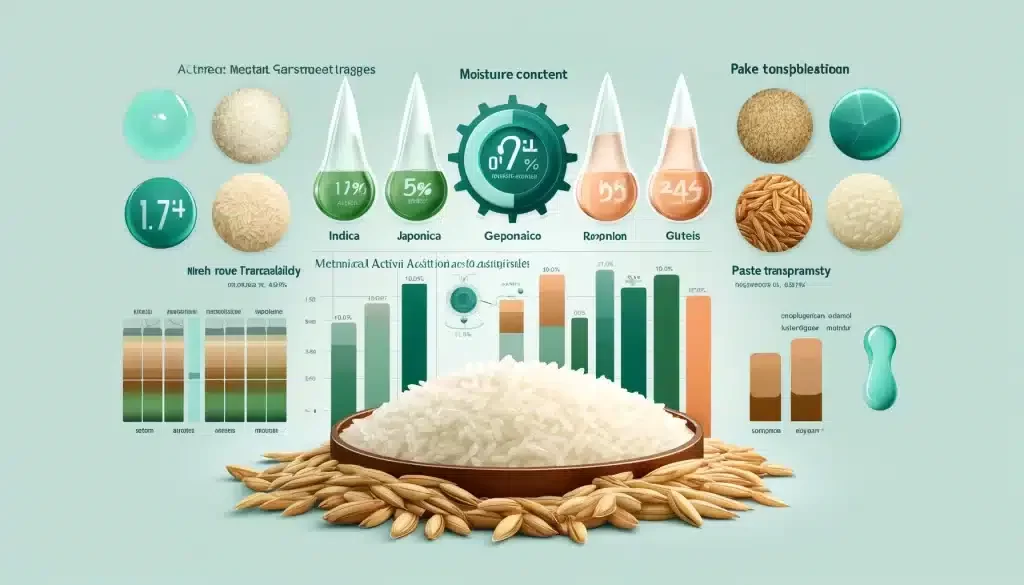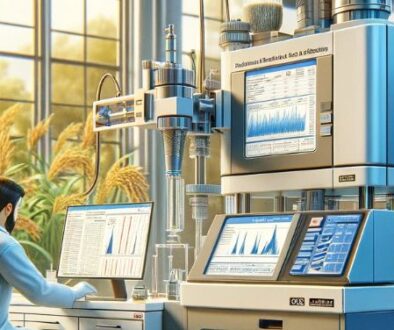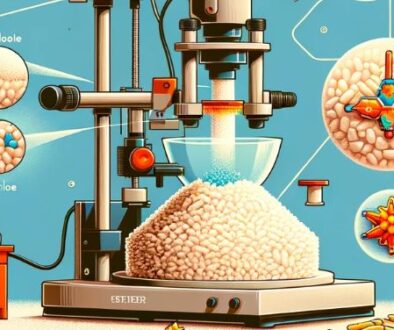Effect Of Moisture Content On Physical And Chemical Properties Of Mechanically Activated Rice Starch
Exploring the impact of moisture content on mechanically activated rice starch properties across indica, japonica, and glutinous rice starch types.
Three types of rice starch, namely indica rice, japonica rice and glutinous rice, were used as raw materials to study the effect of starch moisture content on the physical and chemical properties of mechanically activated rice starch, and obtain a starch moisture content range that is conducive to mechanical activation, thereby improving the mechanical activation effect and shortening the mechanical activation time. Research shows that with the extension of mechanical activation time, the gelatinization degree, cold water solubility rate, paste transparency and reducing power of three kinds of rice starch all increase, while the iodine blue value (BV) all decreases. Indica rice starch is most susceptible to molecular chain breakage when the moisture content is 6.02%, while both japonica rice starch and glutinous rice starch are most susceptible to chain breakage when the moisture content is about 8.50%. In terms of gelatinization degree and cold water solubility, indica rice starch has the highest moisture content at 6.02%, while japonica rice starch and glutinous rice starch have the highest moisture content at about 8.50%. In terms of paste transparency, the three rice starches all have the highest moisture content. The maximum value is around 8.50%; for reducing power and BV, the fastest change occurs when the moisture content of indica rice starch is 3.50%; for both japonica rice starch and glutinous rice starch, the fastest change occurs when the moisture content is around 6.00%. It can be seen that the moisture content of starch has a certain influence on the mechanical activation of rice starch, and the suitable moisture content range of mechanically activated rice starch is about 6.00%-8.50%.
Introduction to the Study on Rice Starch Mechanical Activation
Rice starch, an essential component in various food and industrial applications, undergoes mechanical activation to enhance its functional properties. This process is influenced by several factors, among which the moisture content of the starch plays a pivotal role. In a recent study, three types of rice starches—indica rice starch, japonica rice starch, and glutinous rice starch—were examined to ascertain the effect of starch moisture content on the physical and chemical properties of mechanically activated rice starch. The objective was to identify an optimal moisture content range that would not only improve the effectiveness of mechanical activation but also reduce the duration required for the process.
Impact of Moisture Content on Rice Starch Properties
The study revealed significant insights into how moisture content impacts the mechanical activation of rice starch. It was observed that as the mechanical activation time increased, there was a notable enhancement in several properties across all three types of rice starch. These properties included the gelatinization degree, cold water solubility rate, paste transparency, and reducing power, while the iodine blue value (BV) exhibited a decrease. This indicates a general improvement in the functional qualities of the rice starches, which can be attributed to the alterations in their molecular structures during mechanical activation.
Optimal Moisture Content for Different Rice Starch Types
A critical finding of the research was the variance in susceptibility to molecular chain breakage among the three types of rice starch at different moisture contents. Indica rice starch showed the most significant tendency for chain breakage at a moisture content of 6.02%, while japonica and glutinous rice starches were more prone to this phenomenon at approximately 8.50% moisture content. These differences highlight the importance of adjusting moisture levels according to the type of rice starch being mechanically activated to optimize the process.
Comparative Analysis of Starch Properties at Varying Moisture Levels
Furthermore, the study compared the properties of gelatinization degree, cold water solubility, paste transparency, reducing power, and BV among the three starches, drawing correlations with their moisture content. The findings suggested that the optimum moisture content for achieving the best outcomes in terms of gelatinization and solubility for indica rice starch is 6.02%, while for japonica and glutinous rice starches, it is around 8.50%. Similarly, the highest transparency was observed at a moisture content of about 8.50% for all three starches. The research also pinpointed the moisture content levels that led to the fastest changes in reducing power and BV, providing valuable insights for optimizing the mechanical activation process.
Conclusion: Identifying Optimal Moisture Range for Enhanced Mechanical Activation
In conclusion, the moisture content of starch significantly affects the mechanical activation of rice starch, with an ideal range identified to be approximately 6.00%-8.50%. This discovery not only enhances our understanding of the mechanical activation process but also offers practical guidance for improving the efficiency and effectiveness of this process across different types of rice starch. By adjusting moisture content within this optimal range, it is possible to enhance the functional properties of rice starch more effectively, thereby broadening its application in food and industrial sectors.
For futher details of this article and research, feel free to contact our team for assistance.
Original research was done by Zhang Zhengmao
About ETprotein:
ETprotein, a reputable plant protein vegan protein Chinese factory manufacturer and supplier, is renowned for producing, stocking, exporting, and delivering the highest quality organic bulk vegan protein and plant proteins. They include Organic rice protein, clear rice protein, pea protein, clear pea protein, oat protein, watermelon seed protein, pumpkin seed protein, sunflower seed protein, mung bean protein, peanut protein, various of plant peptides etc. Their offerings, characterized by a neutral taste, non-GMO, allergen-free attributes, cater to a diverse range of industries. They serve nutraceutical, pharmaceutical, cosmeceutical, veterinary, as well as food and beverage finished product distributors, traders, and manufacturers across Europe, USA, Canada, Australia, Thailand, Japan, Korea, Brazil, and Chile, among others.
ETprotein specialization includes exporting and delivering tailor-made protein powder and finished nutritional supplements. Their extensive product range covers sectors like Food and Beverage, Sports Nutrition, Weight Management, Dietary Supplements, Health and Wellness Products, and Infant Formula, ensuring comprehensive solutions to meet all your protein needs.
As a trusted company by leading global food and beverage brands and Fortune 500 companies, ETprotein reinforces China’s reputation in the global arena. For more information or to get a free sample of their protein products, please contact them and email sales(at)ETprotein.com today.












